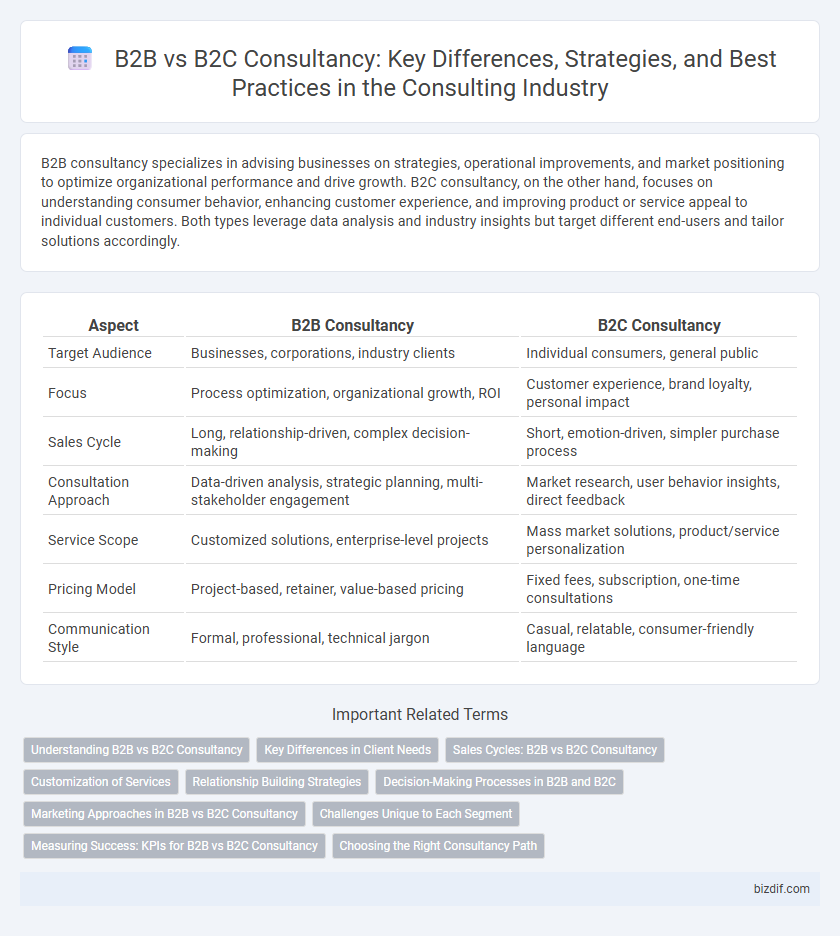B2B consultancy specializes in advising businesses on strategies, operational improvements, and market positioning to optimize organizational performance and drive growth. B2C consultancy, on the other hand, focuses on understanding consumer behavior, enhancing customer experience, and improving product or service appeal to individual customers. Both types leverage data analysis and industry insights but target different end-users and tailor solutions accordingly.
Table of Comparison
| Aspect | B2B Consultancy | B2C Consultancy |
|---|---|---|
| Target Audience | Businesses, corporations, industry clients | Individual consumers, general public |
| Focus | Process optimization, organizational growth, ROI | Customer experience, brand loyalty, personal impact |
| Sales Cycle | Long, relationship-driven, complex decision-making | Short, emotion-driven, simpler purchase process |
| Consultation Approach | Data-driven analysis, strategic planning, multi-stakeholder engagement | Market research, user behavior insights, direct feedback |
| Service Scope | Customized solutions, enterprise-level projects | Mass market solutions, product/service personalization |
| Pricing Model | Project-based, retainer, value-based pricing | Fixed fees, subscription, one-time consultations |
| Communication Style | Formal, professional, technical jargon | Casual, relatable, consumer-friendly language |
Understanding B2B vs B2C Consultancy
B2B consultancy focuses on advising businesses to improve operations, strategy, and growth within complex organizational structures, emphasizing long-term relationships and tailored solutions for corporate clients. In contrast, B2C consultancy targets individual consumers or end-users, prioritizing market trends, customer experience, and direct engagement strategies to influence buying behavior. Understanding these distinctions is critical for consultants to align their expertise with client needs and deliver targeted, impactful recommendations.
Key Differences in Client Needs
B2B consultancy primarily addresses complex organizational challenges, emphasizing strategic alignment, efficiency, and long-term growth plans tailored to business clients. B2C consultancy focuses on individual consumer behavior, personal preferences, and immediate problem-solving to enhance user experience and satisfaction. The key difference lies in B2B's emphasis on scalable solutions and ROI for multiple stakeholders versus B2C's concentration on personalized engagement and direct customer impact.
Sales Cycles: B2B vs B2C Consultancy
B2B consultancy typically involves longer sales cycles due to the need for multiple stakeholder approvals, complex decision-making processes, and higher-value contracts, often spanning several months. In contrast, B2C consultancy features shorter sales cycles driven by individual consumer decisions, immediate needs, and lower transaction values, resulting in quicker conversions. Understanding these differing timelines is critical for tailoring marketing strategies and resource allocation effectively in consultancy services.
Customization of Services
B2B consultancy emphasizes highly tailored solutions to address complex organizational challenges, integrating industry-specific insights and scalable strategies that drive operational efficiency and long-term growth. In contrast, B2C consultancy customizes services to enhance individual customer experiences, focusing on personalized advice, customer behavior analysis, and targeted marketing approaches. The customization level in B2B consultancy involves deeper collaboration and bespoke frameworks, whereas B2C consultancy prioritizes adaptability to diverse consumer preferences and rapid response to market trends.
Relationship Building Strategies
B2B consultancy emphasizes long-term relationship building through personalized communication, trust development, and value-driven collaborations tailored to complex organizational needs. B2C consultancy focuses on rapid rapport creation, emotional engagement, and customer experience enhancement to influence individual purchasing decisions effectively. Both strategies leverage data-driven insights but differ fundamentally in scale and interaction depth to optimize client retention and satisfaction.
Decision-Making Processes in B2B and B2C
B2B consultancy involves complex decision-making processes characterized by multiple stakeholders, longer sales cycles, and a focus on return on investment and strategic alignment. In contrast, B2C consultancy decisions are typically quicker, driven by individual preferences, emotions, and immediate benefits. Understanding these distinctions enables consultants to tailor strategies that address the specific needs and behaviors of business buyers versus consumers.
Marketing Approaches in B2B vs B2C Consultancy
B2B consultancy marketing emphasizes relationship-building, personalized communication, and lead nurturing through targeted content like whitepapers and case studies, aiming to address complex business needs. B2C consultancy marketing prioritizes emotional engagement, broad audience reach, and brand storytelling via social media and influencer partnerships to drive quick consumer decisions. Both approaches leverage data analytics but tailor messaging differently to optimize conversion rates in their respective markets.
Challenges Unique to Each Segment
B2B consultancy faces challenges such as navigating complex organizational structures, longer sales cycles, and aligning services with multiple stakeholders' strategic goals. B2C consultancy requires addressing diverse consumer preferences, rapid market changes, and delivering personalized experiences at scale. Understanding these distinct challenges enables tailored strategies that drive value and client satisfaction in each segment.
Measuring Success: KPIs for B2B vs B2C Consultancy
Measuring success in B2B consultancy centers on KPIs such as client retention rate, average contract value, and sales cycle length, reflecting long-term business relationships and complex decision-making processes. B2C consultancy, however, prioritizes customer satisfaction scores, conversion rates, and repeat purchase frequency to gauge immediate consumer engagement and brand loyalty. These distinct KPIs highlight the strategic differences in performance evaluation between B2B's relationship-driven models and B2C's transaction-focused approach.
Choosing the Right Consultancy Path
Choosing the right consultancy path depends on the target audience and business objectives, with B2B consultancy focusing on helping companies improve operational efficiency, strategy, and market positioning for other businesses. B2C consultancy specializes in enhancing consumer experience, branding, and direct marketing strategies to drive individual customer engagement and loyalty. Evaluating factors like industry type, client needs, and long-term goals ensures selecting a consultancy model that aligns with organizational growth and revenue targets.
B2B consultancy vs B2C consultancy Infographic

 bizdif.com
bizdif.com